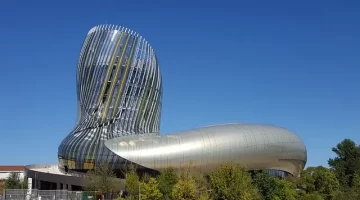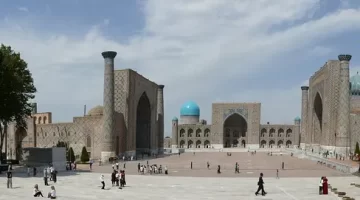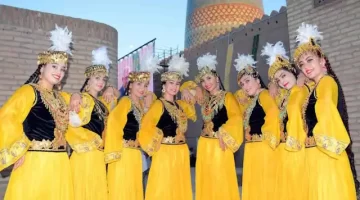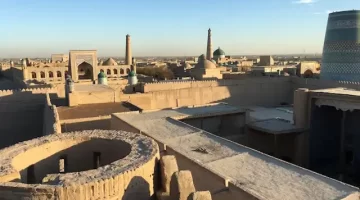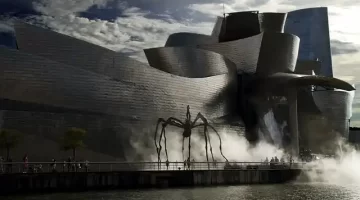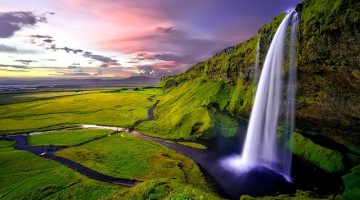Egypt’s Red Sea Riviera
The Travel Pages takes a look at Egypt’s Red Sea Riviera and provides a guide to where to stay and what to do.
by Mike Gerrard

‘It’s got the best diving in the world,’ my newsagent told me about Egypt’s Red Sea. He reached for the shelves and pulled down a diving magazine to prove it, completely oblivious to my total lack of interest in diving. I knew I could trust him, as he had actually been diving all round the globe and bored me before on the subject, but it was life on land and not beneath the waves that has kept me going back to Egypt.
But don’t expect the Red Sea Riviera to be anything like the French Riviera, and certainly not the English Riviera. Parts of it can look a bit down-at-heel, in total contrast to the hotels which are generally immaculate. Some people opt to spend their entire vacation, apart from an excursion or two, lounging by the hotel pool and being treated like millionaires. That’s completely understandable, but a shame too. A wander round the streets will show you life in the real Egypt, and give you chance to meet the locals. The highlights of many people’s holidays are when they get to know someone, and find themselves being invited to their homes to meet the family, to have tea or a meal, or even to go to a wedding. Arabs are genuinely hospitable, it is part of the culture.

Understanding that culture is vital to having a good holiday. Baksheesh probably causes more headaches than anything. Try not to get worked up about it. It is traditional in Moslem countries to give a small tip to anyone who has done you a service. It’s only when someone invents a service you didn’t want in the first place – that’s when you refuse to tip! You always have to remember that most people you will meet on holiday are very poor by Western standards, and they’re trying to make a living as best they can. It’s hard to tell yourself that when you’re being pestered the minute you step out of your hotel, but it is a fact of life.

The easy way to reduce the hassle factor is to take an organised excursion, picked up and dropped off at the hotel door. And Egypt is one country where you must make the most of your visit, and experience as much of the magic of the country as possible. You don’t have to have the least bit of interest in history to be awestruck by the temples, the scale and the beauty of them, and the fact that they have survived for thousands of years. A visit to the tombs in the Valley of the Kings at Luxor will stay with you the rest of your life, as will a trip across the desert from the Red Sea coast, perhaps meeting some of the Bedouin nomads. From Sharm el-Sheik it’s possible to head into the Sinai Desert, to St Catherine’s Monastery (site of the Biblical Burning Bush) and to climb to the top of Mount Sinai, for stunning desert views.

And the diving? OK, I did take a trip in a glass-bottomed boat on my last day in Sharm el-Sheik, and it was wonderful. I could start to see the attraction of diving. Oh well, there’s always next time. And I’ll send my newsagent a postcard.
Where to Stay on Egypt’s Red Sea Riviera?
The most difficult thing about Egypt is choosing where to stay, although this is made much easier if you opt for a two-centre holiday. You can combine diving with the temples at Luxor, or do both Cairo and Luxor, or mix diving with a Nile cruise.

Makadi Bay
Only 24km from Hurghada, making for an easy airport transfer, Makadi Bay is one of the newer developments along this coast. As yet it’s relatively unknown, but it won’t stay that way for long thanks to its fabulous setting with the mountains behind, the desert nearby and the deep blue waters of the Red Sea. There are plenty of top-range hotels here, but no real town or village, so it’s more suited to those who like to stay in their hotel in the evening, and take advantage of its facilities.
Hurghada
Known mainly as the site of the region’s international airport, Hurghada is also a thriving holiday town in its own right, and the best choice for those who want bustle, nightlife, great beaches and good diving. The old part of town has a range of hotels, restaurants and shops and is a good place for a night out. The best hotels tend to be strung out along the coast and it may be a bit of a trek into town, so it’s just as well that most of them are well set-up with all the entertainment and eating options you could want.
El Gouna
Only 21km north of Hurghada, El Gouna is a modern purpose-built tourist area. It’s a luxury development which was begun by a Cairo millionaire, originally for himself, but it grew into one of the most impressive new resorts in the whole of Egypt. There are man-made lagoons here, landscaped golf courses, quality hotels, and all sandwiched between those Red Sea Mountains and the tempting sea.
Sharm el Sheikh
Sharm is one short hop on the plane beyond Hurghada, at the end of the Sinai peninsula. It offers all that Hurghada offers and more, with its cosmopolitan atmosphere and access to the truly spectacular Sinai Desert. An excellent base for diving, too. See our page on Things to Do in Sharm.

Soma Bay
Soma Bay is a modern development about 40km south of Hurghada, and even by Egyptian standards (where they know a thing or two about sand) its beaches are rather special. It’s got something for golfers as well as for divers – a course designed by Gary Player, no less.
Combinations
A Nile cruise is like no other cruise, and whether you go for a day or a week, everyone should try to fit one into a visit to Egypt. To glide down the longest river in the world and watch the ever-changing scenes on the riverbank, which sometimes seem to go back to Biblical times, must be one of the most relaxing travel experiences in the world. It provides all the comforts of a floating hotel with the chance to visit some of the more remote temples such as Abydos and Dendera.

A week’s cruise and a week in Luxor, in Cairo, or on the Red Sea Riviera, is a combination hard to beat. Combining Cairo and Luxor is ideal for those really into Egyptian history, but might cause ‘temple fatigue’ in others. If you really don’t want to cruise then a week in Luxor followed by a week on the Red Sea to relax is also hard to beat.
Abu Simbel

A flying visit to Abu Simbel, close to the border with Sudan and on the shores of Lake Nasser, is another special Egyptian experience. You will recognise at once the four giant statues of Ramses that have been carved out of the very mountainside and been photographed a million times since – though photography isn’t easy because of the location and the sheer scale of the statues. Maybe you should just sit back and enjoy.
Diving on Egypt’s Red Sea Riviera

Everyone agrees that the Red Sea provides some of the finest diving in the world. It’s also cheap, and many divers go here to get their PADI qualifications for that very reason. It’s not just the cheapness, though. The waters are usually crystal-clear, and the sea calm and giving only the gentlest of currents. The consistent climate (some Red Sea resorts boast 360 days of sunshine a year) is also attractive to the marine life, which is there in abundance. So too are coral reefs, and offshore wrecks, which fish and coral both love.
If you’re not into serious diving, you can still go snorkelling and see quite a lot because the waters are beautifully clear and you don’t need to go very far out to find the incredibly colourful fishes. You can rent snorkelling gear but it gets well-used so bring your own from home, if you have it. Even if you can’t swim you needn’t lose out, as you can take a trip in a glass-bottomed boat or a mini-submarine and see what all the fuss is about without even getting your feet wet.
Cairo

Cairo is one of the world’s great cities. It is busy, dusty, hot and chaotic, but it is an experience not to be missed. The Egyptians themselves call it the Mother of the World, and it is crammed with 22 million people — rich and poor, mansions and slums, Muslim and Christian and Jew, the new and the old, and of course all the sights that visitors want to see.
In this city is one of the world’s great museums, the Egyptian Museum, which like the city can seem dusty, crowded and chaotic too. A guided tour helps make sense of the place, and covers the highlights that shouldn’t be missed, including of course the glorious treasures from the tomb of King Tutankhamun. The city’s other great treasures are the Pyramids at Giza, the only one of the Seven Wonders of the ancient world to be still surviving. If you can time your visit to this timeless spot for the evening Sound and Light Show, you should definitely do so. Like the one at the Karnak Temple in Luxor, it is really impressive.

There are other pyramids at Sakkara, Egypt’s old capital, including the oldest known pyramid, the Step Pyramid of Zoser, dating back to 2668-2649BC. Nearby are the ruins of the ancient city of Memphis, not as spectacular as some but with a great atmosphere, surrounded by peaceful palm groves. After the bustle of Cairo, you might welcome it.
Egypt’s Red Sea Riviera Fact file
Prices
The cost of living in Egypt is surprisingly cheap. Prices in the hotels are naturally higher than out on the street, but not outrageously so.
Food and drink
You won’t eat badly in Egypt. The food tends to be spicy but not overly hot, and although there isn’t a wide choice on many menus, your evening meals and lunches by the pool or the sea will still be a memorable part of your holiday.

Fresh fish is good and comparatively inexpensive. Grilled meats especially kebabs are popular, and stuffed pigeon is a national dish (tasty but fiddly to eat). To discover what’s what, try eating a mezze, small plates of lots of different dishes. Although Egypt is a Muslim country, beer and wine are readily available in tourist areas and the wine is surprisingly smooth. Ancient Egypt was a prolific and respected wine-making nation.
Getting around
It is perfectly safe to walk around in Egypt, but the main drawback is being hassled by vendors, which can get really irritating. Public transport is cheap, but not for the faint-hearted. Taxis are a better bet, and not too expensive. It is a brave visitor who hires a car in Egypt. Consider instead hiring a car and a driver, which is not too costly and a lot less harrowing.
Be careful when hiring the caleshes (horse-drawn carriages), aimed at giving a short town tour or getting you from A to B. Establish the price first, and be sure what currency you are dealing in. One sharp practice is to quote you ‘ten pounds’, and while you think it’s a bargain at ten Egyptian pounds, they will demand ten British pounds at the end, and can get unpleasant if you try to argue.
Shopping

Prices are cheap in Egypt but you must remember to haggle. Don’t start haggling unless you intend to buy, though. Good bargains include anything made from Egyptian cotton, carpets, jewellery, spices and paintings done on papyrus.
Days (and nights) out
The Sound and Light Show at Karnak Temple in Luxor is a memorable experience, as is a balloon ride to see the Valley of the Kings at dawn. Nile cruises are quite magical, even if you can only manage a day cruise, and from the Red Sea resorts the chance to visit the monastery of St Catherine at the foot of Mount Sinai should not be missed.

Major events and festivals
Ramadan is the major Islamic feast, when good Muslims abstain from food and drink during daylight hours for 30 days. Tourists are mostly unaffected, but it is as well to be aware of religious sensibilities. When Ramadan ends, there are three days of celebrations, including lots of eating. About ten weeks later is the Feast of the Sacrifice, and four days of festivities when families traditionally slaughter a sheep and share its meat.
Health
No jabs are necessary for Egypt, but mosquitoes are widespread and an anti-malarial course is recommended. You should also consider hepatitis A and typhoid. See your doctor for up-to-date advice, as some areas are safer than others.
The worst danger is an upset tummy, although most tourist hotels have strict hygiene regulations. The tap water is in theory safe to drink, but not recommended as it is heavily chlorinated. Bottled water should be used at all times. Wash your hands after handling money. One look at the average Egyptian note and you’ll know why. Some of them seem to date from the time of the Pharoahs.
Security
Like most Arabic countries, Egypt is a very safe place. If you lose any money it probably won’t be through theft but by being overcharged for a carpet! Security guards are everywhere, which can itself seem a little frightening initially, but they help keep the country a safe and peaceful place for visitors.
